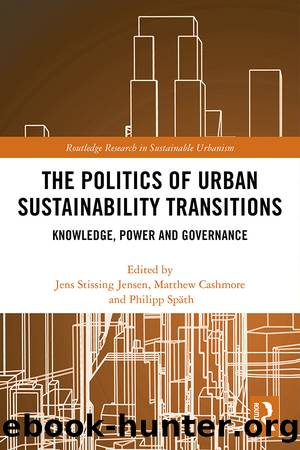The Politics of Urban Sustainability Transitions: Knowledge, Power and Governance by unknow

Author:unknow
Language: eng
Format: epub
ISBN: 9781138479654
Google: xjekswEACAAJ
Goodreads: 40986172
Publisher: Routledge
Published: 2018-10-23T00:00:00+00:00
6 Competing knowledge assemblages in Danish heat governance
Jens Stissing Jensen1 and Peter Karnøe2
Introduction
Contemporary imaginaries of future low-carbon energy systems are often populated by wind turbines and solar panels. Decarbonisation of energy systems based on such production technologies presupposes the distribution and use of electrical energy and that these systems are made compatible with the weather-dependent production patterns of renewable technologies. Over the last decade energy governance has been increasingly concerned with how to conceptualise distribution infrastructure and end-use domains as smart building-blocks of the energy system that can be made compatible with intermittent power production.
So-called smart power grids that can be controlled and optimised through a combination of modern ICT technology and real-time price signals have been heavily promoted as an important component of low-carbon energy systems (JRC Science Hub 2017). In Denmark alternative imaginaries of the building-blocks of future low-carbon energy have also been cultivated. Energy-system models have indicated that heat provision (and cooling) of buildings should be considered a âsmartâ component in adapting energy systems to fluctuating low-carbon power production (Lund et al. 2014). By converting electricity into hot water that can be stored for days, weeks or months, it has been argued that district heating infrastructures can provide affordable flexibility, and in large volumes.
Much discourse on how to develop distribution infrastructures and end-use domains is conducted within idealised laboratory-like imaginaries of technical energy-system models. In some cases, the smart building-blocks cultivated under such laboratory assumption have been tested in pilot experiments (EcoGrid eu 2016). However, it is rarely discussed how novel and innovative ideas about the role of distribution infrastructures and end-use domains in low-carbon energy systems can be integrated into the governance activities through which energy systems are concretely reproduced and transformed on an everyday basis.
In response to the relative neglect of the real-world everyday governance of low-carbon energy transitions, the purpose of this chapter is to analyse how political rationalities pertaining to energy governance are constructed and controlled. We also discuss how such rationalities may be transformed in response to new societal objectives, such as achieving carbon neutrality. More specifically, we explore how political rationalities pertaining to one specific building block of the Danish energy system â heat provision â have been developed, shaped and contested over the past 40 years.
In doing this we pay specific attention to how political rationalities and the resulting governance activities are predicated on the ways in which heating is rendered knowable. This is because system governance is fundamentally a knowledge-dependent activity. Consider, for example, the complex types of knowledges that are needed to identify, value and compare different investment options in heating, given their long technical lifetime, their many technical interdependencies with the broader energy system and their relations to political objectives. In the following analyses we argue that the knowledge-configuring devices and procedures that actors have at their disposal in qualifying such mundane decision situations are an essential political ingredient of heat governance because such devices and procedures constitute a means to effectively control and shape the rationalities that inform planning and investment practices.
Download
This site does not store any files on its server. We only index and link to content provided by other sites. Please contact the content providers to delete copyright contents if any and email us, we'll remove relevant links or contents immediately.
The Secret History by Donna Tartt(19041)
The Social Justice Warrior Handbook by Lisa De Pasquale(12185)
Thirteen Reasons Why by Jay Asher(8887)
This Is How You Lose Her by Junot Diaz(6874)
Weapons of Math Destruction by Cathy O'Neil(6263)
Zero to One by Peter Thiel(5786)
Beartown by Fredrik Backman(5737)
The Myth of the Strong Leader by Archie Brown(5496)
The Fire Next Time by James Baldwin(5429)
How Democracies Die by Steven Levitsky & Daniel Ziblatt(5211)
Promise Me, Dad by Joe Biden(5141)
Stone's Rules by Roger Stone(5080)
A Higher Loyalty: Truth, Lies, and Leadership by James Comey(4948)
100 Deadly Skills by Clint Emerson(4917)
Rise and Kill First by Ronen Bergman(4777)
Secrecy World by Jake Bernstein(4739)
The David Icke Guide to the Global Conspiracy (and how to end it) by David Icke(4699)
The Farm by Tom Rob Smith(4502)
The Doomsday Machine by Daniel Ellsberg(4484)
